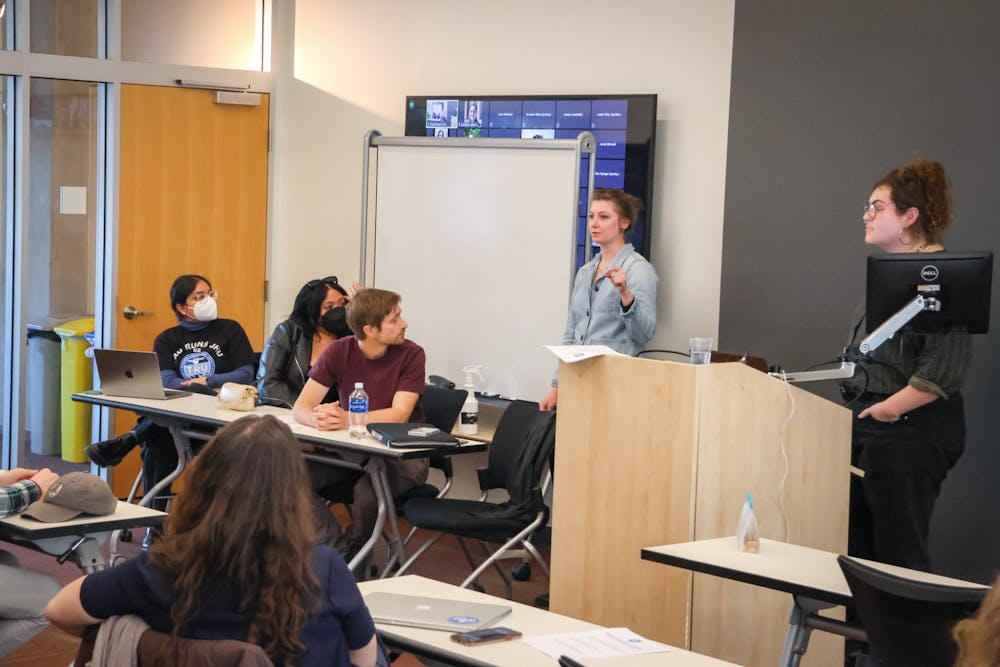Teachers and Researchers United (TRU-UE) hosted a discussion panel entitled “Building Safe Communities without JHPD” on March 29. The event featured four panelists, comprised of both doctoral students and community members.
Stephanie Saxton, a Political Science doctoral student at Hopkins, was the first speaker. To contextualize the claims and actions currently taken against the Johns Hopkins Police Department (JHPD), Saxton provided a timeline of its development.
In March 2018, Hopkins first announced the bill that would authorize the establishment of a University police force. According to Saxton, student organizers convened to discuss the announcement, which led to the creation of Students Against Private Police (SAPP).
SAPP’s initial campaign targeted elected officials through lobbying, door-knocking, base-building and petitions, which successfully prevented the bill from passing legislation at the time.
“This is an important part of the history. We always have to remember that Hopkins lost when they first tried to do this. There are victories to be had in this fight against institutional power,” Saxton said. “Hopkins spent [over] $500,000 on lobbying. We were all volunteers. We tried to facilitate as much as possible.”
Despite continuous organization efforts, the bill was reintroduced and passed in 2019, after which the campaign shifted to target Hopkins administration through direct student organization like on-campus protests.
Following the timeline outlined by Saxton, Russell Trimmer, a member of the Harwood Community Association, explained the reasons behind community opposition against JHPD.
“The first [reason for opposition] was difficulty with transparency and oversight,” he said. “Secondly, there are youth funds and other community projects tied to the bill that we felt were inappropriate. Thirdly and most significantly, the Community Association felt that policing is an inappropriate way of dealing with any security concerns [given] that statistics [state] that suspects of the Hopkins Homewood security are 75.9% Black and 1.9% White.”
Bry Reed, a Baltimore-born-and-raised writer, facilitator and prison abolitionist, described how to approach thinking about alternative practices of community safety.
Instead of framing safety solely as a policing problem, Reed prompted members to think of the JHPD as a community question.
“We live in a world where people closest to the problem are damn sure closest to the solution. When you think about policing overall, you have to think about who policing is mandated to control, isolate and take out,” she said.
The final panelist Janvi Madhani is a Physics doctoral student, TRU-UE organizer and member of the bargaining committee. Madhani explained why policing is a union issue and gave an overview of the deep-rooted history of racism in campus policing.
As an example, Madhani pointed to the 1930s when Black residents near college campuses first raised demands against the racist housing practice known as redlining.
In an interview with The News-Letter, Shivang Agarwal, a first-year doctoral student in the Environmental Health and Engineering Department, expressed his agreement with the repercussions of private policing but noted his concerns about the lack of immediate solutions to high criminal activity in surrounding areas.
“I know that private police is bad. I don’t know what the solution is because I know lighting the streets cannot reduce criminal activities,” he said. “We are devising solutions for people who are going to live here for five years, seven years, 10 years, but what about those people who are only here for one or two years? We are not looking at short-term solutions for them.”
In an email to The News-Letter, Madhani addressed Agarwal’s concerns, asserting that members of the Hopkins community need to recognize that they are residents of Baltimore.
“We are part of this larger fabric and there is no ‘us’ vs. ‘them,’” she wrote. “It can be frustrating to hear that there is no short-term solution to crime, but it is equally frustrating to see and witness all the ways in which our neighbors and community members are left behind, their needs [are] systematically unmet, and [they] are sentenced to a lifetime of carceral violence by birth.”
In an email to The News-Letter, Claude Guillemard, senior lecturer and senator of the Krieger School of Arts and Sciences Faculty Senate Police Committee, commented on the importance of community dialogues in driving future action.
Guillemard highlighted that true dialogue on the JHPD has not taken place on the Hopkins campus.
“The administration has failed to offer the expected format of real ‘listening sessions’ and ‘town halls,’” she wrote. “I am still looking for a way to organize ‘safe places’ to listen to each other: not to have a debate but to hear where each one is coming from. It is about learning, not attacking.”
She believes that the only format that could work is a town hall modeled after the Baltimore City government, which would give each speaker a certain amount of time to express themselves without interruption.
During the panel, Reed emphasized that Hopkins sits in the center of the Baltimore community and that each Hopkins student is part of that community.
“You are in Baltimore right now. This idea that Baltimore surrounding you? You are in it bro. You are on top of it. You are not some separate bubble of people, and what happens here affects everybody else who doesn’t go here,” she said. “We have to demystify the idea that Baltimore is some criminal that Hopkins needs to protect its people from.”





